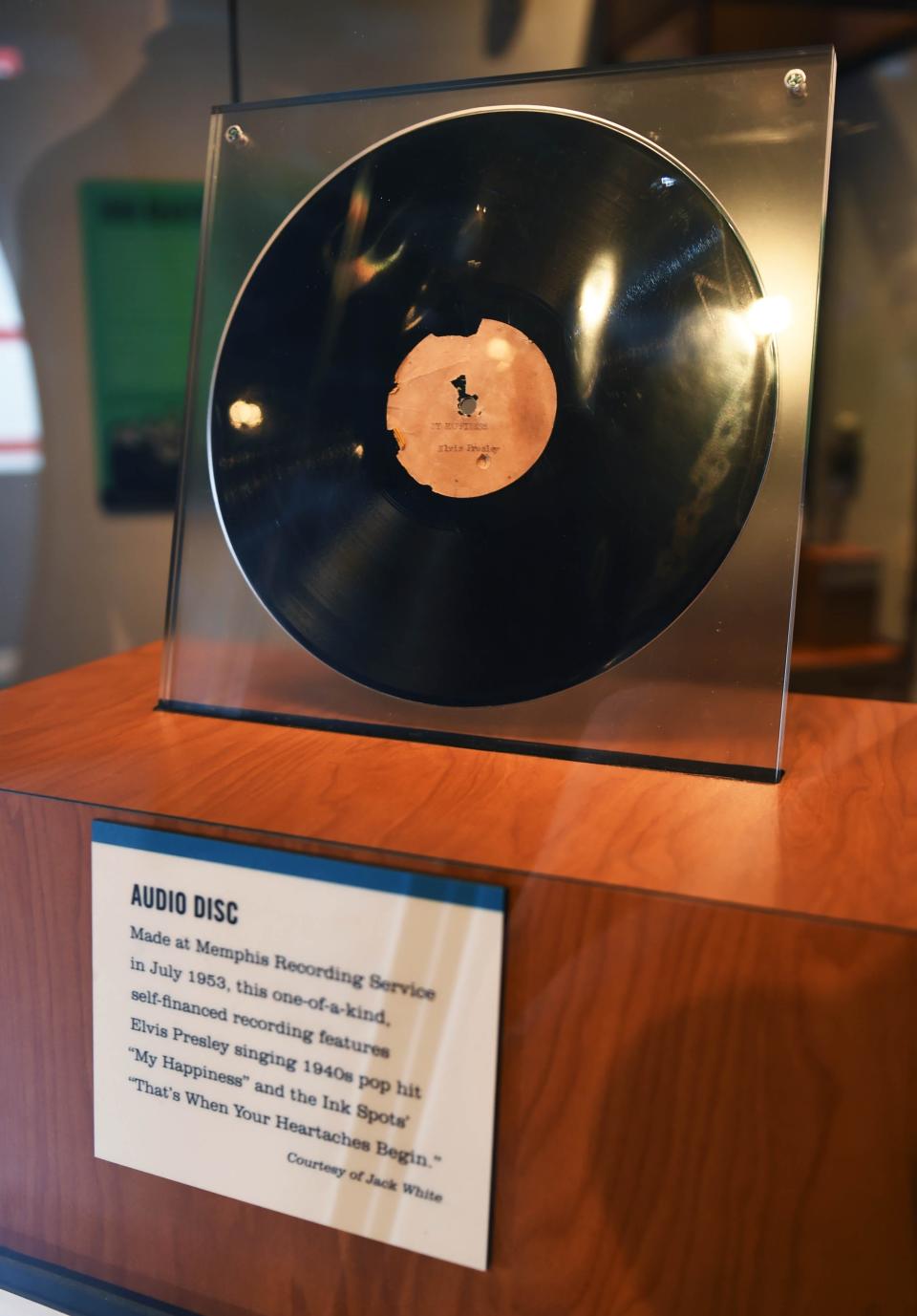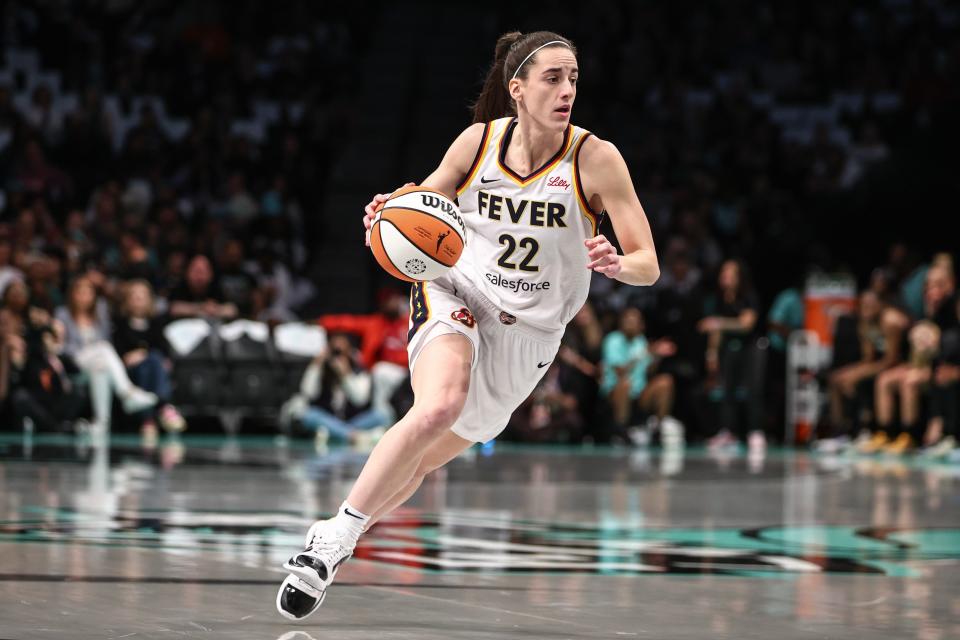Caitlin Clark's whiteness makes her more marketable. That's not racist. It's true.
The first time I visited the National Museum of African American Music, in early 2021, there was a particular piece that caught my eye. It was a sign featuring a quote from Sam Phillips, a Memphis-based record executive who owned Sun Records in the 1950s and 1960s.
In his early career, Phillips made his name and money recording Black blues artists including B.B. King, Little Milton and Howlin' Wolf. The blues were Phillips’ first love, a music that he believed transcended race in its reflections on the trials and triumphs of life that all humans experience. Yet race did matter, this Phillips knew – especially when it came to economics.
“If I could find a white man who had a Negro sound and a Negro feel,” he said, “I could make a million dollars.”
What happened next for Phillips is, as they say, history. He'd go on to record Elvis Presley, a white man who achieved dizzying commercial success by molding his singing and dancing styles to the Black artists, both Gospel and secular, who had shaped the soundtrack of his youth.
There's a reason nonwhite artists seek that 'crossover' hit

But Elvis’ adoption/appropriation of Blackness is less critical to his stardom than his whiteness. If that wasn’t the case, the Black artists he emulated would’ve reached similar heights themselves.
Instead, in America – a predominantly white society with a very long record of white supremacist ideologies – whiteness becomes the primary standard by which all is measured and, in business, the primary market to which all products are targeted. It's why the word “mainstream” is used to refer to outlets or platforms with largely white audiences, and why so many nonwhite artists and entrepreneurs still strive for that ever elusive, ever lucrative “crossover.”
It’s also why Mattel didn’t release its first official Black Barbie until 1980, more than 20 years after the original, blonde-haired and blue-eyed Barbie debuted (though white Barbie was given a Black friend, Christie, in 1968).
Kristi Yamaguchi: Dorothy Hamill doll inspired me. I hope my Barbie helps others dream big.
Or why a 2020 report from The New York Times revealed that between 1950 and 2018, 95% of the novels published by America’s largest publishing houses were written by white authors.
Or why three reports from McKinsey show that Hollywood is missing out on up to $30 billion each year because of entrenched racial bias and lack of cultural representation.
Somehow, however, this reality has been lost in the conversation about Caitlin Clark and her significant impact on women’s basketball. She’s a star, some say, without consideration of the stars who’ve come before. It’s the market, they add, without mentioning how and why the market was built – or who maintains it.
Sports system has limited opportunity for all but select players
To be clear: There are others who have addressed the enduring marketability of whiteness. They’ve spoken to the media’s prior refusal to push the WNBA with the same fervor it has had this year. They’ve also mentioned the fact that before A’ja Wilson’s recently announced Nike deal, no Black WNBA player has had a signature shoe with a major brand since Candace Parker in 2010-11.
But without fail, even when mentioning Clark’s significant talent, those people have been denounced as racists or race baiters.

It’s a lazy allegation frequently hurled at nonwhite folks who dare to speak to the very real, very persistent issues around race in America.
Never mind that the same accusers go to doctor’s appointments and answer detailed questions about their family medical history – understanding the present relevance of their parents’ or grandparents’ health status, even as they eschew historical precedent in service to their modern opinions.
So instead of learning from this moment and having real-time conversations about the intersection of race, gender and sports in America, those of us who know better end up screaming into an empty, useless void while everyone else holds fast to their unfounded, ahistorical views.
Opinion alerts: Get columns from your favorite columnists + expert analysis on top issues, delivered straight to your device through the USA TODAY app. Don't have the app? Download it for free from your app store.
Why this issue has to do with the recent Harrison Butker speech

I experienced this phenomenon recently, when I wrote about Harrison Butker’s opposition to diversity, equity and inclusion despite owing much of his platform to an MVP-winning, Super Bowl champion, Black quarterback.
(Note: This should go without saying, but if Patrick Mahomes refers to himself as Black – and he does – then I will, too.)
Did Butker forget who he plays for? Harrison Butker decries diversity, but he can thank Black QB Patrick Mahomes for his fame
Thousands and thousands of readers, the vast majority of them white men, raced to my inbox and social media mentions to criticize points that I didn’t actually make.
While skipping over the historical perspective I provided – which clearly reveals the struggles of previous Black quarterbacks who cleared the path for Mahomes – readers said that I called Mahomes a DEI hire, even though that couldn’t be further from the truth.
The problem is that, in their minds, DEI serves to usurp qualified white candidates with unqualified, yet entitled, Black and brown ones. So they argue that Mahomes earned his position on his own merit (which is true) and present Black QBs like Warren Moon as proof that the position has always been a meritocracy.
Except: Warren Moon is proof of the opposite. He's been vocal about his decision to begin his pro career in the Canadian Football League as opposed to the NFL, because he knew he wouldn’t have an opportunity to play quarterback in the United States, despite his college successes.
But this truth doesn’t align with those readers’ views of the world, views that were shaped in a vacuum devoid of knowledge and understanding.
Butker made strong statement on women: NFL player Harrison Butker is correct about motherhood. He's wrong about our choices.
Not surprisingly, many of those same readers also took issue with my assertion that anyone but Butker himself is responsible for the kicker’s fame/platform (note that I did not say his talent or ability).
I’d venture to say, however, that many of those same people would happily agree with the chorus crediting Clark for bringing viewers, dollars and general relevance to the WNBA – including other WNBA players – all on her own.

Their take: It was Butker’s skill that propelled him to acclaim, not the fact that he just so happens to play alongside one of the best quarterbacks in NFL history.
Yet regarding the growth of women’s basketball, it’s all about Clark. The other players who get on the floor, night after night, even for other teams, and who play so well that even the immensely talented Clark has struggled to adjust, have nothing do with it.
Andrea Williams is an opinion columnist for The Tennessean, where this column first appeared. She has an extensive background covering country music, sports, race and society. Email her at adwilliams@tennessean.com or follow her on X, formerly known as Twitter: @AndreaWillWrite
You can read diverse opinions from our Board of Contributors and other writers on the Opinion front page, on Twitter @usatodayopinion and in our daily Opinion newsletter.
This article originally appeared on Nashville Tennessean: Caitlin Clark shows the enduring marketability of whiteness in sports

 Yahoo Sports
Yahoo Sports 
